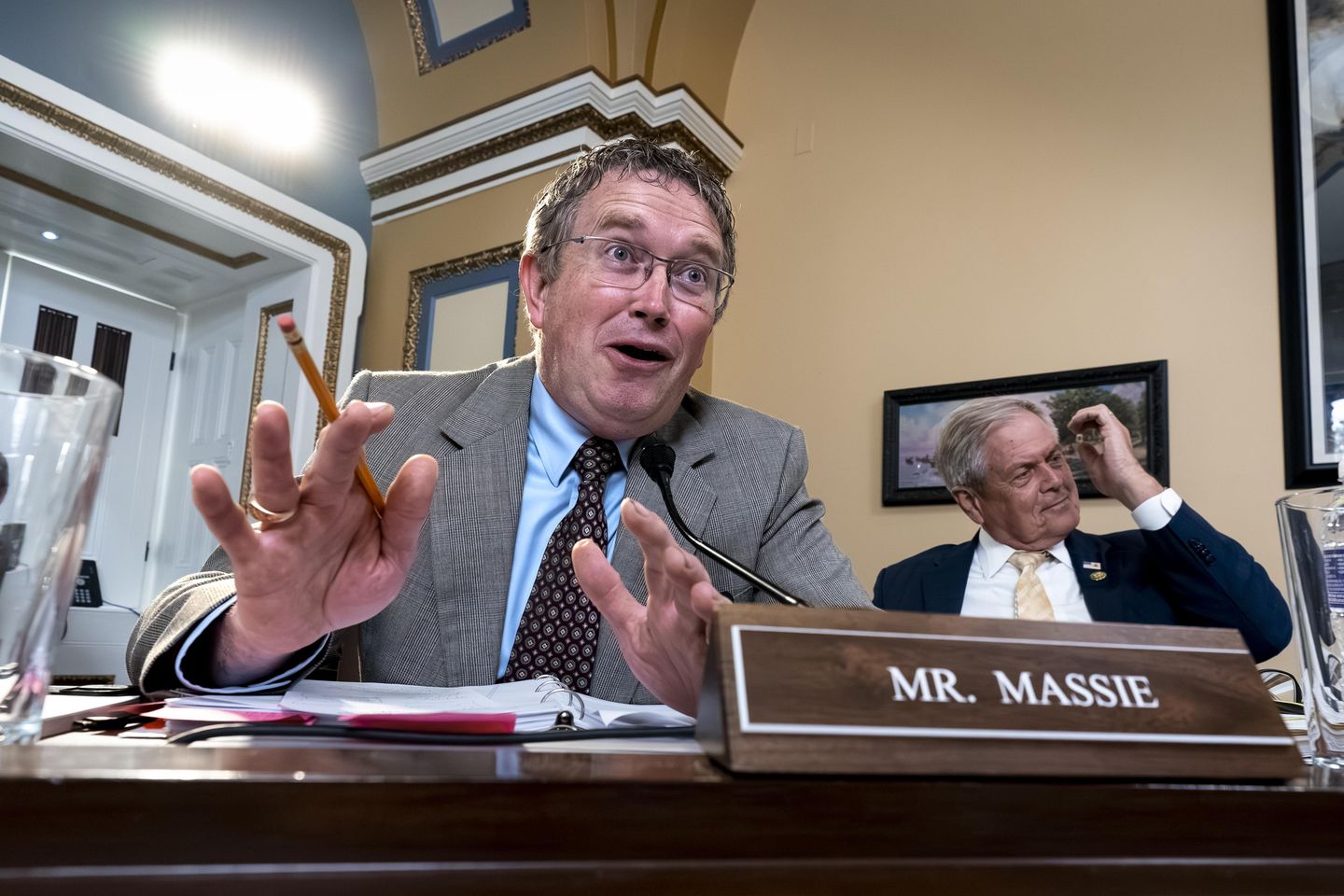
As pressure mounts on congressional Republicans to unify and compromise on spending policy for President Trump’s agenda, two Kentuckians are standing firm on conservative fiscal principles and voting against the party.
The mavericks, Sen. Rand Paul and Rep. Thomas Massie, were the sole Republican “no” votes in their respective chambers on two key votes this Congress and could oppose a coming package containing much of the president’s agenda if it adds to the $36 trillion national debt.
Neither voted for a recent government funding stopgap that mostly continued Biden-era spending levels. They also rejected dueling House and Senate Republican budget blueprints for Mr. Trump’s agenda, saying the measures did not go far enough to cut spending amid rising deficits.
In separate interviews with The Washington Times, the two lawmakers said they do not coordinate their votes but their strict views on fiscal policy often align.
“I don’t try to pressure him or vice versa. But we come down the vast majority of time on the same side of issues, and I think it’s because we believe the same things,” said Mr. Paul, citing their support for limited constitutional government.
They also do not fold under pressure.
“They know the futility of trying to change my position once I’ve made my position known,” Mr. Massie said. “I’m locked and loaded, and that’s the vote I’m taking.”
The president has demanded loyalty to him and the party above all else, but that doesn’t drive Mr. Paul.
“Allegiance to party is always secondary to allegiance to the right things and the right principles,” he said. “I’ve never understood anybody who would say I’m voting for the party above principle.”
After Mr. Massie refused to support the government funding stopgap, the president declared he would “lead the charge” to oust him in Kentucky’s Republican primary election next year.
“He’s just another GRANDSTANDER, who’s too much trouble, and not worth the fight,” Mr. Trump said on social media.
Mr. Massie said the president never called to try to persuade him to vote for the funding stopgap. He suspects ulterior motives.
“I think the reason for that attack was they were trying to keep the Freedom Caucus in line, and they didn’t want any more horses out of the barn,” Mr. Massie said. “And if they saw me getting attacked, even though I can withstand it, they might be worried that they couldn’t.”
It is not the first time Mr. Massie has been the immovable object to Mr. Trump’s unstoppable force.
He recalled that the most pressure he ever felt was in March 2020 when both parties dogpiled on him for opposing a $2 trillion COVID-19 relief package. Mr. Trump demanded that he be thrown out of the Republican Party.
That earned Mr. Massie a primary challenger, whom he easily defeated, 81% to 19%. His first fracas with the president gave him “Trump antibodies,” he joked.
Mr. Paul has not received the same public criticism from Mr. Trump, whom the senator considers a friend. He argued that opposing the government funding bill for not codifying the president’s Department of Government Efficiency cuts is “standing for his position on foreign aid.”
“And it’s actually much of the Republican establishment that opposes any cuts to foreign aid,” he said, citing a failed 27-73 vote on his amendment to codify roughly $16 billion in those cuts.
Mr. Paul has been a leading voice for a formal presidential request that Congress codify the DOGE cuts through a process known as rescissions.
Rescissions are exempt from the Senate filibuster, meaning Republicans can enact the cuts if they are united. Mr. Paul said the vote on his amendment is “worrisome” and reflects hesitation from “bigger spenders” in the Republican Party.
“The president needs to use his political capital to come to our caucus and to look these people in the eye, to sit down in their office and say, ‘What’s it going to take? The country’s bankrupt, our interest is over a trillion dollars. Are you willing to cut anything?’” he said.
Mr. Paul and Mr. Massie suggested breaking up rescissions into smaller packages to make it easier for Congress to approve at least some cuts.
“We should be doing those every week,” Mr. Massie said. “It’s sort of like an ice climber. We need to put our anchors in the ice. Every time DOGE gets another step up.”
Republicans will have another test of their willingness to cut spending in the coming weeks when the House and Senate attempt to approve a unified budget blueprint for Mr. Trump’s agenda.
A budget resolution the House approved last month sets a goal of cutting $2 trillion in spending alongside a $4 trillion increase in the debt limit and sweeping tax cuts.
The Senate is wrestling over the spending and tax cut figures while considering raising the debt limit to $5 trillion to ensure Congress will not need to revisit the issue until after the 2026 elections.
Mr. Paul said the proposed debt limit increase is a nonstarter for him.
“It’s not that I’m against borrowing money, but if I vote for $4 trillion, that means I’ve now approved of a government that borrows $2 trillion a year, and I’m just not for that,” he said.
Mr. Paul does support his Senate Republican colleagues’ push to use the budget reconciliation process to make Mr. Trump’s first-term tax cuts permanent.
Republicans can’t afford more than three defections in the Senate, and other deficit hawks in the chamber have concerns.
“If there were four people like me willing to say no, guess what? We can become yes, [but] they’ll have to negotiate with us,” Mr. Paul said. “If it’s just me, they won’t negotiate with me.”
Mr. Massie has more leverage in the House because Republicans cannot afford more than two defections in the chamber. Still, he expects Republican leaders to try to sway other members rather than accommodate his concerns on the budget blueprint and subsequent reconciliation package adding to the debt.
“What I would do is do as many spending cuts, dollar for dollar, as you do tax cuts, and then if you get any windage from economic stimulus of having lower taxes, then that’s what you use to reduce the deficit,” Mr. Massie said.
The Kentuckians said their votes are popular back home.
“I don’t worry about popularity among Republicans because I think they see me fighting against debt and against spending,” Mr. Paul said. “Frankly, it’s people on the other side of issues who have trouble at home and who get booed at their Republican conventions.”
Mr. Massie has taken challenges to his position in stride. The loss of his wife, Rhonda, last year has reinforced his convictions.
“I used to be able to go home and just forget about the craziness and get recharged and reinforced,” Mr. Massie said. “And now it’s different. There’s nobody to reinforce me at home.
“I have no F’s to give,” he said. “I’m the last person you want to mess with right now.”






![Trump's Admin Guts Another ‘Rogue Government Agency with Zero Accountability’ [WATCH]](https://www.right2024.com/wp-content/uploads/2025/03/Trumps-Admin-Guts-Another-‘Rogue-Government-Agency-with-Zero-Accountability-350x250.jpg)
![‘We All Owe Him (Elon) a Huge Debt of Gratitude’ [WATCH]](https://www.right2024.com/wp-content/uploads/2025/03/‘We-All-Owe-Him-Elon-a-Huge-Debt-of-Gratitude-350x250.jpg)









